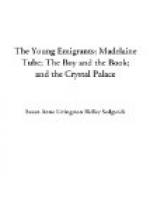The principal occupation of Hans was, however, to assist his mother in carrying on some part of her husband’s former trade; she having become acquainted with many of the secrets of the art by which colors could be extracted from plants and mineral substances, so as to give to wool, flax, and silk, bright and unchanging colors. In those days such operations, instead of being carried on in large factories and workshops, and by wholesale as it were for the manufacturer of the material, were often done just as people wanted any one particular article of dress to be of a particular color. For instance, a woman who had fashioned for her husband a rudely knitted vest of wool of her own spinning; would bring the rather dingy garment to Frau Gensfleisch to have it made red or blue, so that, worn under his brown leather jerkin, it might look smart and gay;—or the young hunter, on going to the chase, would come to her to have the tassels of his bow or horn made scarlet or yellow;—or the knight equipping himself for war would send to her the soiled plume of his helmet, to be made of a brilliant crimson—to say nothing of the knight’s lady, who, as she sat at home in her dismal castle, with little else to amuse her but the embroidery frame, would be forever sending down her maidens and serving-men into the valley with skeins of wool and silk, to be dipped into Frau Gensfleisch’s dye-pots, and brought back to her of every color of the rainbow. In this way Hans’ mother continued to make a comfortable living, and Hans himself was a very important help to her, in the carrying on of her little art.
It was Hans’ business to collect the numerous herbs and plants that his mother required for the different colors. He not only knew well which plants would produce certain colors, but knew where they could be found, and at what seasons they were fit for use. Of some he carefully collected the blossoms when fully expanded in the mid-day sun—of others the leaves and stalks—while in many the coloring matter was to be extracted from the roots, which Hans would carefully dig up, knowing well by the forms of the leaves above ground, the kind of root that grew beneath the soil.
This kind of knowledge which Hans had been picking up ever since he was a very young child, made him at twelve years old a most useful little personage, and although he had never learned to read or write, or even been in a school, yet he could not by any means, be called ignorant, for he not only observed and remembered all that came in his way, but he turned his knowledge to the best account, by making it of use to himself and others.
We say that Hans could neither read nor write, but it must not therefore be thought that such acquirements were not valued in those days; on the contrary, it was considered at that time one of the very best and most desirable things in the whole world to be able to read, and one of the cleverest things in the world to be able to write; while he who was so happy as to be the possessor of a book, was esteemed one of the most fortunate of human beings.




